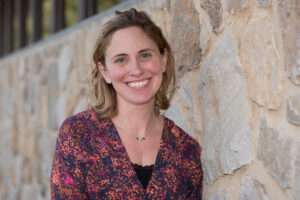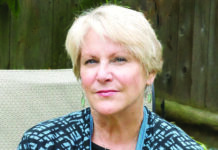
Holocaust and genocide studies is a common area of study at colleges and universities. But Holocaust and genocide education is less common, according to educators at Rowan University.
In fact, Rowan, based in Glassboro, New Jersey, is the only school to offer such a program as a master’s degree, according to Jennifer Rich, its director.
The 30-hour, 10-course master’s degree serves K-12 teachers and public historians. Half of the program consists of history classes about the Holocaust and other genocides. The other half focuses on how to teach about the Holocaust and genocide in K-12 classrooms.
Rich, an associate professor in the Department of Sociology and Anthropology at Rowan, and Jody Russell Manning, an instructor in modern European history, launched the program in September 2020. That term, the program had six students. By September 2023, it had grown to 15.
It’s growing “slowly and steadily,” Rich said.
Twenty-six states mandate the teaching of the Holocaust. New Jersey is one of them. Pennsylvania is not. But the number has grown in recent years.
Rowan’s program serves that expanding need, according to Rich. But even when there’s no need, there’s often a desire.
“What we hear repeatedly is teachers are either mandated to teach about the Holocaust and other genocides or want to teach about them in some way or are already doing it and struggling to do it well,” she said.
Rowan’s program aims to go deeper than the Holocaust’s basic facts, according to Rich. Its goal is to give educators an understanding of the circumstances that caused the Nazi party and, ultimately, regime to take and hold power.
“How we might think about that in ways that are more complicated than a single sentence summary, which is what we often hear from high school students,” she said.
The Holocaust “was not a single event,” Rich said. It “unfolded over a long period of time,” she added.

On top of that, genocide “doesn’t really end,” the educator said. “The mass killing ends,” she continued. “The memory, the bringing to justice of, the honoring of the victims, goes on indefinitely,” she concluded.
These larger themes are important because they help teachers clarify the lessons of the Holocaust and other genocides, according to Rich. Teachers often tell Rich that they have merely a week to teach the Holocaust.
“We want our teachers to know enough that they pick what and how to teach,” she said. “What I can offer is not all the answers but the ability to ask better questions over time.”
Rowan started in 1923 as a teachers’ college. This program carries on that tradition, according to Manning.
“There are many Holocaust and genocide studies programs, and mainly they focus on history,” he said. “No one’s really looking at how do we actually teach this not only in a classroom setting but in a public setting as well.”
Manning teaches required courses on the history side of this master’s degree. To help teachers gain a deeper understanding, he takes them to historical sites once a year. This year, he is taking his students to visit Nazi concentration camps. But not all of Manning’s trips focus on Nazi Germany.
“I want them to walk away with an understanding of similarities and differences. Unfortunately, this happens over and over,” he said. “As we are talking, there is genocide with the Rohingya. There is genocide with Uighurs. Those lessons need to be discussed and thought about not only from a historical perspective but in our contemporary world.”
Rich is the granddaughter of Holocaust survivors. In 2015, she was working at Rowan on a year-to-year contract when the state asked the school to start what became the Rowan Center for Holocaust and Genocide Studies.
Rich was already researching what teaching students should know about the Holocaust. She volunteered to help open the center with historian Stephen Hague. They co-founded the center that same year. That was also the year that Rich applied for a tenure-track position and got it.
The master’s program in Holocaust and genocide education is part of the Rowan Center for Holocaust and Genocide Studies. Rich thinks more states will start to mandate Holocaust education in the future.
“My hope is that as we grow and as more people learn about our work, and as more states put emphasis on mandating Holocaust education, we are able to meet more students,” she said. “I think it’s an important program. I think it does important work in the world. My goal is to make it as accessible and available to as many students as I can.”






